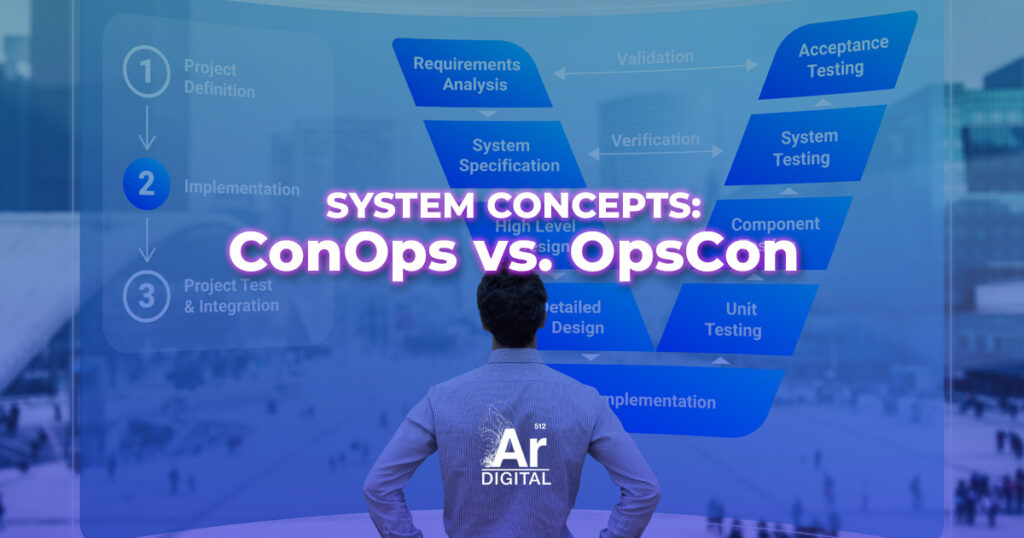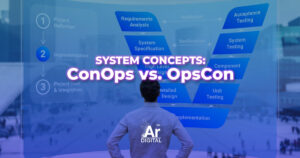Implementing ConOps and OpsCon in Systems Engineering
In complex system development, misalignment between stakeholders and engineers can lead to costly revisions, inefficiencies, and project failures. To prevent this, two key documents help define system expectations and operational needs:
- Concept of Operations (ConOps) – a high-level document outlining how a system will be used from the user’s perspective.
- Operations Concept (OpsCon) – a more detailed document explaining how the system will function operationally.
Both play a critical role in aligning stakeholders, guiding development, and ensuring the system meets its intended purpose. This blog will break down ConOps and OpsCon, highlight their differences, and provide best practices for developing them effectively.
What Are ConOps and OpsCon?
Concept of Operations (ConOps)
A ConOps document provides a broad, user-centric overview of how a system will be used and why it is needed. It is written in simple, non-technical language to help decision-makers, users, and stakeholders understand the system’s purpose.
Key Elements of a ConOps:
- System purpose and objectives
- High-level operational scenarios
- User interactions and workflows
- Benefits and limitations of the system
ConOps acts as an early alignment tool, helping stakeholders visualize the system before engineers start designing it.
Operations Concept (OpsCon)
While ConOps explains what a system is supposed to do, OpsCon details how it will actually function. This document is more technical and focuses on system implementation from an engineering and operations perspective.
Key Elements of an OpsCon:
- Detailed operational workflows and system states
- Interaction between system components
- Use cases and scenarios for different operational conditions
- Performance expectations and constraints
OpsCon serves as a bridge between conceptual planning and actual system development, ensuring engineers have clear guidelines for system functionality.
Key Differences Between ConOps and OpsCon
| Feature | ConOps | OpsCon |
|---|---|---|
| Focus | User perspective | System functionality |
| Purpose | Align stakeholders | Guide engineers and developers |
| Level of Detail | Broad, conceptual | Detailed, technical |
| Audience | Executives, users, decision-makers | Engineers, system architects |
| Scope | High-level scenarios | Detailed system workflows |
While both documents help guide development, they serve different audiences and functions. A strong ConOps ensures alignment, while an OpsCon turns that vision into actionable engineering details.
Best Practices for Developing Effective ConOps and OpsCon
Developing a Strong ConOps
- Engage stakeholders early: Collaborate with decision-makers, users, and engineers to capture diverse perspectives.
- Clearly define system objectives: Ensure that the purpose and goals are easy to understand.
- Use real-world scenarios: Describe how the system will function in day-to-day operations.
- Keep it user-focused: Avoid excessive technical jargon to make it accessible to all stakeholders.
Creating a Detailed OpsCon
- Translate ConOps into detailed workflows: Define exactly how the system will operate.
- Specify system interactions and states: Document how different components work together.
- Use visual aids: Flowcharts and diagrams help clarify complex interactions.
- Ensure clarity and consistency: The document should be structured for engineers to reference easily.
Want to Master ConOps and OpsCon? Take This Course!
Developing ConOps and OpsCon requires structured knowledge and best practices. If you want to learn how to create these essential documents effectively, check out this Systems Engineering course.
- This course covers:
How to develop clear, effective ConOps and OpsCon - Best practices for systems engineering and operational planning
- How to align technical development with stakeholder expectations
Don’t leave system design to guesswork—learn how to document it right! Sign up today and start building systems that work seamlessly from concept to execution. 🚀



